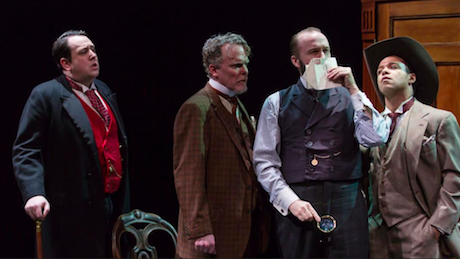'Baskerville' At Long Wharf Plays As Both Comedy, Complex Mystery
By Christopher Arnott
carnott@courant.com
‘Baskerville” was confounded by a midweek mystery: Where did all that snow come from? Wednesday’s nor’easter postponed the play’s press opening until Thursday, when its scenes of cold, windy weather in England’s West Country were particularly resonant in New Haven County.
The main mystery, once you've acclimated to the sudden storminess, is:
Who's that darn hound who’s been attacking folks on the moors? Or is it a dog? No, it looks like a man. Who now looks like a woman. Who’s with that other man. Who was just a different man a moment ago.
Brian Owen, left, Daniel Pearce, Alex Moggeridge and Christopher Livingston in "Baskerville." (T. Charles Erickson)Ken Ludwig’s “Baskerville” is an adaptation of one of the most famous whodunits of all time: Arthur Conan Doyle’s Sherlock Holmes adventure “The Hound of the Baskervilles.” Ludwig cleverly ups the mystery by having three of the five cast members each perform numerous small roles, most of whom are suspects in a grisly murder on the moors.
The quick change gimmick was a staple of comic melodrama in Doyle’s own time. In our time, it’s easy to compare “Baskerville” to Charles Ludlam’s similar flurry of costumes, accents and ghoulish crimes “The Mystery of Irma Vep,” which Long Wharf staged (in a co-production with Hartford Stage) in 2004.
The actors’ gestures are grand and dramatic, though often when the players wave their arms about it’s because they’re taking off a coat or putting on a new wig.
As with his adaptation of Agatha Christie’s “Murder on the Orient Express,” currently playing at Hartford Stage, Ken Ludwig follows the original story faithfully — until he feels the action flagging, at which point he adds comic routines or plot twists all his own. In both adaptations, he creates a whole new (possibly fatal) incident just before the houselights go up for intermission.
In “Baskerville,” the playwright finds room to mock opera (as he did in his most famous play “Lend Me a Tenor”) and indulge in overwrought death scenes (as he did in “The Game’s Afoot”). He and director Brendon Fox evoke Mel Brooks’ “Young Frankenstein” with a “walk this way” joke and some harsh Teutonic diction.
Sherlock Holmes And 'Baskerville' Get The Ludwig Comic Touch At Long WharfThe changes to Doyle’s original story are light and mostly have to do with how some of the characters are presented. Instead of a stuffy gentleman, Sir Henry Baskerville is played as a Texan cowboy — replete with a 10-gallon hat — by Christopher Livingston. The sole woman in the cast, Kelly Hutchinson, enjoys doing silly British accents.
The actor playing the fool most often is Brian Owen, who worked with director Fox on a different production of “Baskerville” that played two theaters in Ohio last year. Owen is the actor who gets the most permission to overact. He howls and hoots and flops about and goes deliriously insane.
But at the center of this mad whirl, there’s a relatively sober suspense drama — brooding, darkly lit and full of clues that you can follow yourself as the mystery unravels. Ludwig clearly cares about mystery as much as he does about comedy.
Neither Alex Moggridge as Holmes or Daniel Pearce as Watson are mimicking any other famous portrayals of these characters. They’re certainly not beholden to the old Basil Rathbone and Nigel Bruce model of a super-logical, humorless Holmes and his bumbling, stuttering sidekick. Yes, the detective can be obnoxious, and the doctor’s constant amazement at his friend’s ingenuity can be annoying, but the relationship is a real one.
Moggridge and Pearce demonstrate how these men could be such close friends. Moggridge has a stridency and confidence that deviates fiercely from his previous mild-mannered roles at Long Wharf — George Bailey in “It’s a Wonderful Life” (2011) and Karl/Steve in “Clybourne Park” (2013) — but he’s also whimsical and warm. Pearce’s Watson misses some clues but doesn’t play the fool.
This particular adventure is a special one in the Sherlock Holmes canon because it requires Holmes and Watson to be apart for much of it. Instead of Watson simply documenting Holmes’ deductions, the sidekick gets a lot of scenes all to himself.
This is far from the first funny “Hound of the Baskervilles.” I’m personally fond of the 1978 Peter Cook/Dudley Moore film version, which also does some amusing multiple casting (though in that case it’s the actor playing Watson who assumes multiple roles). What’s notable about this “Baskerville” rendition is how, even though it makes merry use of caricatures and stereotypes, it does not devolve into self-parody.“Baskerville”’s good if you need a laugh. It’s also surprisingly good if you need a complex mystery drama.

